The combat against the COVID-19 epidemic continued,
In Building No. 4 of Tsinghua Student Dormitory, professors of the epidemic emergency response team of the Department of Earth System Science (DESS) were found
Risking themselves and their families being infected.
To take on the task of serving students in Building No. 4.
It turned out that the most gorgeous turn was to countermarch against disaster
The most amazing color was pure white.
This winter was not cold,
Because we saw the strength condensed by sincerity and responsibility.
These days were unforgettable,
Because we witnessed countermarching heroes, who gathered into a beam of light.
Making this special period particularly moving and brilliant.
"Students, your meals are here."
A female classmate living in Building No. 4 said to her roommate, "I should not hear voices, right? How come I heard a gentleman’s voice? "
This classmate didn't have hallucination. The man speaking was Prof. Huang Xiaomeng from the Epidemic Emergency response team of the DESS. As one of the first volunteers of the emergency response team stationed in Building No. 4, he was delivering meals for his students.
We were duty bound to overcome difficulties together
In mid-December, with the increasingly severe COVID-19 pandemic situation, the campus epidemic prevention and control were confronted with new challenges, and the original security system was severely impacted. The Department of Earth System Science (DESS) rapidly implemented the spirit of the emergency meeting of the university, set up an online and offline emergency response team, took charge of No. 4 student dormitory according to the requirements of the university, assisting the manager of Building No. 4 doing a good job in epidemic prevention and emergency response. Under the unified leadership of the Party Committee of the Department, the DESS set up a building command team. Luo Yong, secretary of the Party Committee and Dean of the DESS, and Huang Xiaomeng, assistant to the Dean, served as the commanders, and Fu Meijuan, an office clerk of the department, was responsible for material support. Huang Lei, Bai Yuqi, Wang Jiayin, Yan Xiaohui, Zhang Tao, Shi Yunhao, Cai Wenjia, Li Wei and Xu Meng signed up to join the emergency response team.
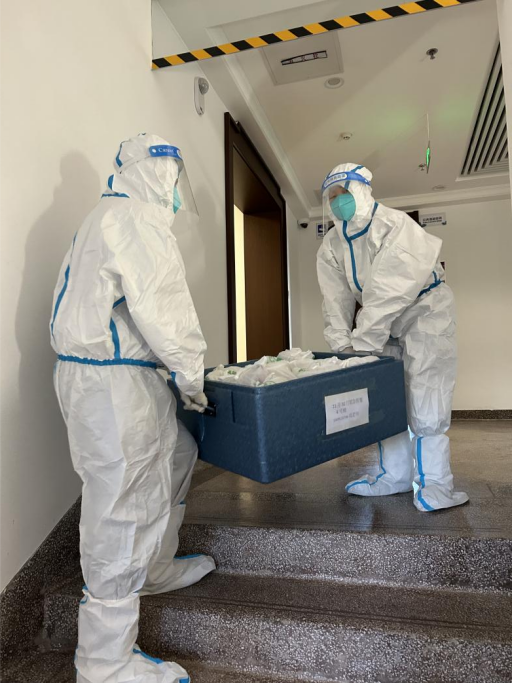
Building Manager Wang Tong and the cleaning lady delivered meals to the students together.
After the establishment of the emergency response command, Luo Yong, the commander, immediately contacted Ms. Liu Fang, the former commander, to learn about the security service and student infection in the building, and set up a working system as soon as possible to carry out the work in time. Through coordination both online and offline, inside and outside the building, the emergency response team assisted the epidemic prevention and control work in Building No. 4, and did their best to meet every need of the students in the building.
With the increasing number of infected people, the logistics staff, including the manager of Building No.4, fell ill one after another, and all the security tasks of Building No.4 were undertaken by the emergency response team of the DESS.
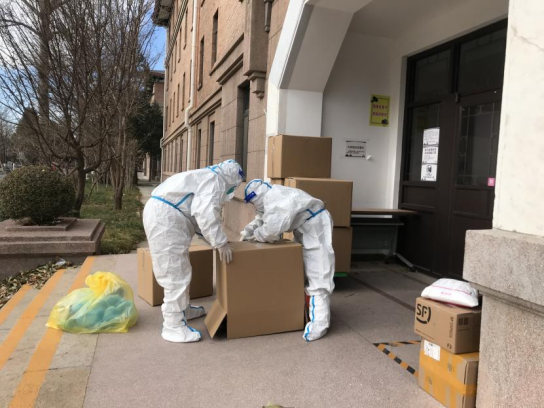
Professors of the emergency response team was packing medical waste.
At 7 o'clock on the morning of December 12th, Luo Yong, Huang Xiaomeng and Huang Lei entered Building No. 4 as the first group of volunteers. Huang Lei recalled, “On the morning when I first entered Building No.4, it was still dark and I could still see the bright moon when I looked up. The street lamps were still shrouded in a misty morning fog. In front of Building No. 4, a large yellow garbage bag indicated that it would be a busy day.” After listening to the detailed explanations given by Yu Bo, the head of the district, and Wang Tong, the building managers, the professors learned that about 18 students had been infected and were being quarantined in their dormitory. The three professors quickly adapted to the work mode of epidemic prevention and control in the dormitory, sorted out the work flow, took stock of epidemic prevention materials, medicines and living materials, and identified the floor distribution of the infected students. Considering that Building No. 4 was a girl's dormitory, Huang Lei and the cleaning lady delivered meals, fetched water, changed disinfection water and cleaned up domestic garbage for the students. Huang Xiaomeng was responsible for counting anti-epidemic materials and the number of students tested positive and ordering meals, so as to make accurate statistics and reports. When there was a shortage of hands, he would also go upstairs to deliver meals. From time to time, the infected students sent messages in the WeChat group that they wanted water. Huang Lei ran upstairs and downstairs for more than 20 times in one morning in heavy protective clothing. The moment when he took off his protective hat, sweat ran down his hair, and his clothes were soaked inside and outside.
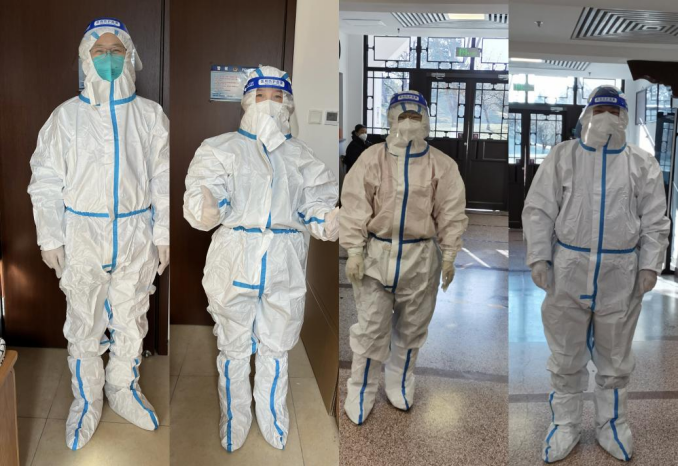
DESS professors of the emergency response team took turns to serve Building No. 4. From left to right were Bai Yuqi, Wang Jiayin, Yan Xiaohui and Zhang Tao.
On December 15th, Bai Yuqi and Wang Jiayin took the place of Huang Xiaomeng and Huang Lei and arrived at Building No. 4. While on duty, Bai Yuqi learned the correct method of treating medical waste, and communicated with Fu Meijuan, who was in charge of material procurement in the emergency response team. The DESS purchased small garbage bags, calculated the total number according to the number of days of quarantine, and distributed them to quarantined students one by one, informing them of the correct method of tying garbage bags in the WeChat group. The improved method and process not only reduced the risk of virus transmission in the corridors, but also improved the efficiency of garbage collection and treatment. According to the university's notices and documents, Wang Jiayin refined the rules of antigen distribution and proposed specific workflow suggestions.
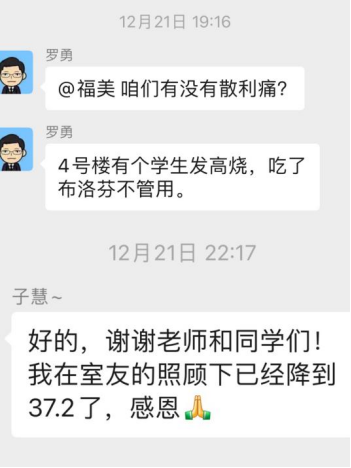
Protecting students' health is also the top priority of the work of the professors stationed in the dormitory building. Commander Luo Yong's mobile phone was on 24 hours a day. Once he received any message that a student had a fever and needed medicine, he would coordinate quickly, making sure that students with symptoms could take medicine accurately according to the instructions. He was concerned with the health and safety of the students all the time.
We worked in concerted efforts to overcome challenges and welcome spring
With the volunteers of the DESS emergency response team infected one after another, the team was facing urgent shortage of manpower. Cai Wenjia, Li Wei and postdoctoral fellow Shi Yunhao from the DESS signed up to join the team immediately after they recovered from the infection themselves. "Before my joining the team, I went through the whole process of infection and recovery. I took this opportunity to communicate with the students who stayed in university, understand their health status, and worked in the places where students needed help most. In epidemic prevention and control, the professors of the volunteer emergency response team paid attention to every message from the students, worked both online and offline, and responded to the students' demands through practical actions. The students passed on this spirit of love and mutual assistance, encouraged and supported each other. The recovered students took over the baton of volunteer service. Beam of dim light gathered together to become a powerful guardian force," said Shi Yunhao .
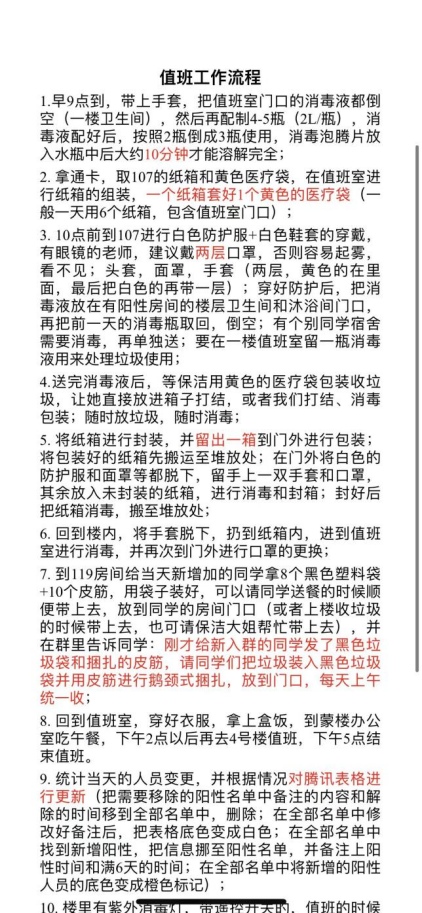
Screenshot of some contents of the duty workflow
To facilitate the professors of the follow-up emergency response team to carry out their work in a more orderly and efficient manner, Yan Xiaohui, with a view to her two-day experience in the building, worked out a thousand-word "work flow table" with other professors. With the constant change of epidemic prevention and control requirements, Yan Xiaohui constantly updated and revised the work flow table, which significantly improved the efficiency of the work handover between emergency response team professors and volunteers and ensured the stable and continuous development of the service for the building.

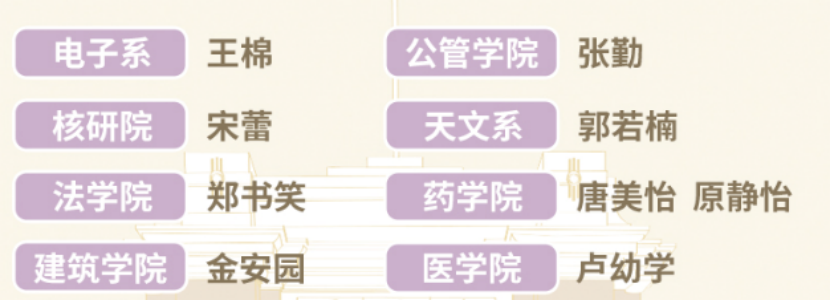
Xu Yawei, a direct-track doctoral student in the DESS, despite being off campus, took the initiative to undertake the work of jointing the volunteers in the building after her recovering. habilitation. Students who have recovered from the infection in Building No. 4 also signed up to join the volunteer team. By far, nine student volunteers have undertaken the epidemic prevention work in Building No. 4.
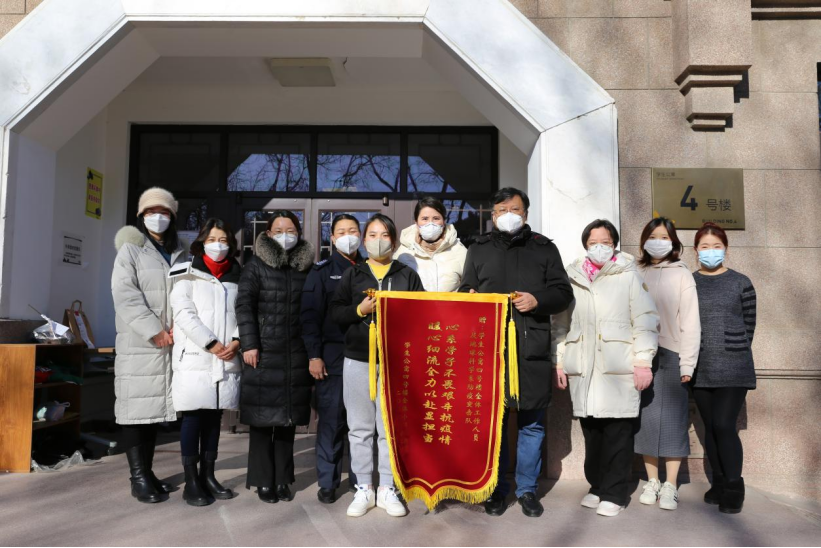
Students recovered from COVID-19 infection in Building No. 4 presented a silk banner to the building staff and the epidemic emergency response team of the DESS.
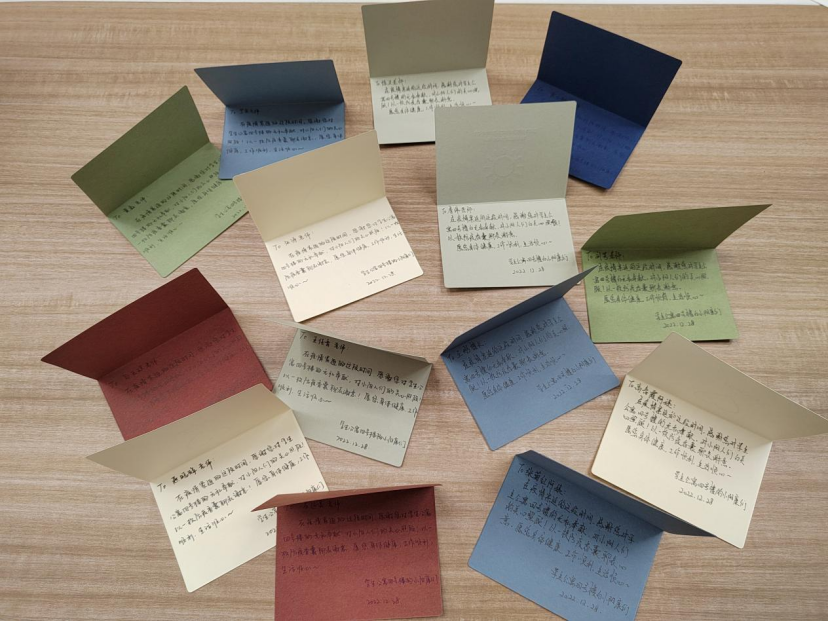
Thank-you cards prepared by students in Building No. 4 for the professors in the emergency response team of the DESS.
With the continuous recovery of the staff in Building No. 4 and their return to their posts, the emergency response team of the DESS gradually handed over the offline work to the staff, and withdrew from the building as a whole on December 31. The floor-climbing trolley purchased by the DESS and the flatbed truck used to transport articles on each floor were reserved for the students in Building No. 4. In order to express their gratitude, the students in Building No. 4 presented a silk banner and carefully prepared small gifts to the emergency response team of the DESS.
For professors who have participated in the emergency response team, this experience will be an unforgettable memory during the three-year epidemic control and prevention. Despite their different identities, the original intention of joining the emergency response team is the same, which comes from that responsibility and the mission of practicing through action. When asked about the original intention of signing up for the emergency response team, Huang Lei said, “I have been enjoying the convenient life and rigorous academic atmosphere in Tsinghua University for two years. With the spread of the epidemic and the increase of the number of infected people in the society, I could practically understand the difficulties and pressures of university epidemic prevention, and I have always hoped that I can contribute my own strength to the university’s efforts in epidemic prevention. What came to mind at that time was Lin Zexu's words, ‘I will do whatever it takes to serve my country, even at the cost of my own life.’ The present era may no longer require us to affront death as our ancestors did, but I hope we can at least uphold patriotism, help and serve regardless of difficulties or rewards.”
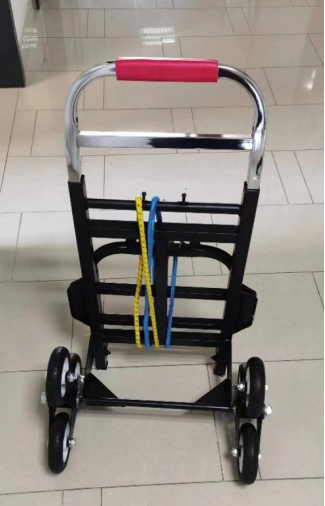
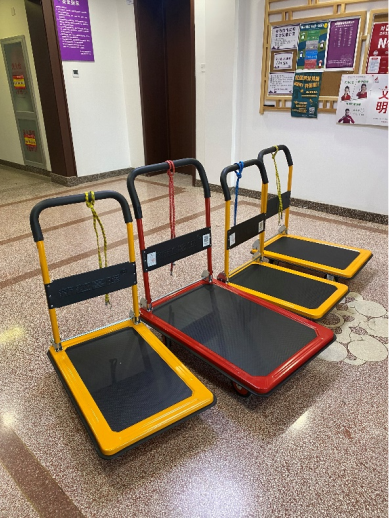
Flat-bed carts and stair-climbing carts purchased by the epidemic emergency response team of the DESS.
Yes, as long as persistence and responsibility are there, when the severe winter passes, the snow melts, and the grass turns green, there must be new encounters to carry on compassion.
The Tsinghua campus is always a home of peace and security for students.
Written by Wang Jiayin
Photographs provided by Wang Tong, the emergency response team professor and building manager of the DESS
Reviewed by Luo Yong